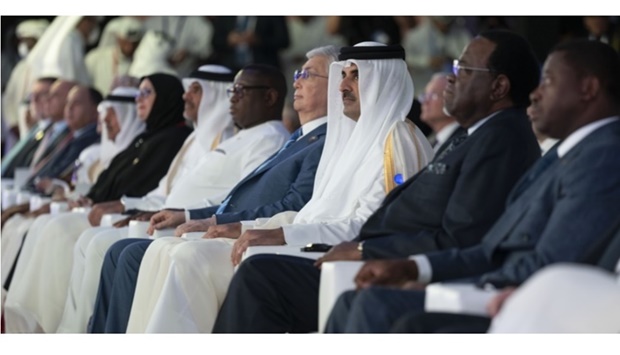The food crisis should neither be left to the law of supply and demand nor should the issue of extreme poverty be left to the poor countries to face alone, His Highness the Amir Sheikh Tamim bin Hamad al-Thani said on Tuesday while addressing the Second Qatar Economic Forum, Powered by Bloomberg.
His Highness the Amir said among the impacts of the Ukrainian crisis are the rise in energy and grain prices and the effects of that on the global economy.
"There are immediate humanitarian repercussions emanating from the interaction of the effects of war in Ukraine and local crises, such as in Ethiopia, Yemen and Syria, in a way that may immediately result in exposing hundreds of thousands of people to the risk of starvation," he said, according to an unofficial translation of his speech, provided by Qatar News Agency.
"There are issues that have no economic solution, these include the war and its devastating consequences on Ukraine and many other countries and peoples. The solution, in this case, can only be politically oriented. Given the circumstances of war, the food crisis should neither be left to the law of supply and demand nor should the issue of extreme poverty be left to the poor countries to face alone," he said. "Our success in overcoming these challenges remains dependent on the ability of all our countries to adhere to a set of principles, foremost among which is the consolidation of justice, equality and solidarity and rejection of double standards."
He said the Covid-19 pandemic has revealed the extent of the gap between the rich and poor nations, and contributed to its expansion, especially during the faltering efforts to achieve development and reduce poverty.
"The international community must adopt an approach that could translate words and goodwill into practical steps that could achieve equality in economic recovery among countries and salvage the sustainable development goals in a way that could support the poor people and those suffering from turmoil and wars," he added.
His Highness the Amir said among the impacts of the Ukrainian crisis are the rise in energy and grain prices and the effects of that on the global economy.
"There are immediate humanitarian repercussions emanating from the interaction of the effects of war in Ukraine and local crises, such as in Ethiopia, Yemen and Syria, in a way that may immediately result in exposing hundreds of thousands of people to the risk of starvation," he said, according to an unofficial translation of his speech, provided by Qatar News Agency.
"There are issues that have no economic solution, these include the war and its devastating consequences on Ukraine and many other countries and peoples. The solution, in this case, can only be politically oriented. Given the circumstances of war, the food crisis should neither be left to the law of supply and demand nor should the issue of extreme poverty be left to the poor countries to face alone," he said. "Our success in overcoming these challenges remains dependent on the ability of all our countries to adhere to a set of principles, foremost among which is the consolidation of justice, equality and solidarity and rejection of double standards."
He said the Covid-19 pandemic has revealed the extent of the gap between the rich and poor nations, and contributed to its expansion, especially during the faltering efforts to achieve development and reduce poverty.
"The international community must adopt an approach that could translate words and goodwill into practical steps that could achieve equality in economic recovery among countries and salvage the sustainable development goals in a way that could support the poor people and those suffering from turmoil and wars," he added.


